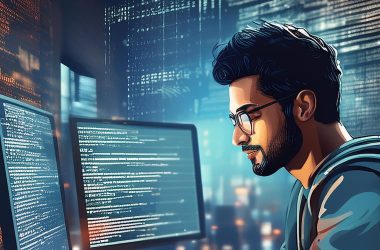Recently, when I saw another article about ChatGPT, I thought, “What’s the big deal of it? Why is everyone talking and writing about it?” In my attempts to find answers to these questions, I found dozens of posts about AI in general. And I’m wondering, if artificial intelligence is such a popular topic right now, does this mean that it is the start of a new era of human development?
Admittedly, artificial intelligence is shaping humanity’s future in nearly every industry. It is already the primary driver of emerging technologies such as big data, robotics, and IoT, not to mention generative AI, with tools such as ChatGPT and AI art generators gaining mainstream attention, and it will remain a technological innovator for the foreseeable future.
ChatGPT gained its popularity because its creators used an innovative method of AI training called Reinforcement Learning from Human Feedback (RLHF). This method was earlier implemented in DeepMind’s Sparrow and Anthropic’s Claude, but OpenAI (the ChatGPT creator company) is undoubtedly the AI project that succeeded in implementing this model the most. That is why people are now talking about ChatGPT and using it widely for different purposes.
Before ChatGPT’s introduction to the world, the topic of AI was also quite popular among the developer community because people realized that this technology had become real. With the current level of technological development, the things we saw in movies like The Terminator or The Matrix do not seem so fictional and unrealistic. And that’s the main reason for such an interest to the field of artificial intelligence.
ChatGPT is just the tip of the iceberg; in fact, AI tools are widely used in various fields, like:
- Navigation;
- Marketing,
- Robotics;
- Gaming;
- Healthcare.
These are only a few examples where AI is already applicable. And that’s just the beginning; the AI we know right now is at the start of its development, and such breakthroughs as the one with ChatGPT illustrate that with every new AI tool, there will be more improvements in mechanisms and AI functions.
In which industries can AI be beneficial in the future?
Here, I’d like to share my thoughts and predictions on the top three fields where artificial intelligence can be developed the most in the future:
Health care
I already mentioned this industry as one of those where AI is currently developing. The introduction of AI into healthcare has been revolutionary, reshaping how we diagnose, treat, and monitor patients. This technology is significantly improving healthcare research and outcomes by allowing for more accurate diagnoses and personalized treatments. The ability of AI in healthcare to quickly analyze vast amounts of clinical documentation assists medical professionals in identifying disease markers and trends that would otherwise go unnoticed.
In the future, I believe that it will be possible for people to use AI for not only making clearer predictions of diagnoses but also tracking their health condition without going to the doctor on a daily basis. Furthermore, it is crucial to implement AI in the healthcare bureaucratic system to avoid information loss or confusion and to create a worldwide system of patient and disease tracking.
The most difficult challenge for AI in these healthcare domains is ensuring their adoption in daily clinical practice, not whether the technologies will be capable enough to be useful.
Entrepreneurship
The role of AI in entrepreneurship in a broader sense is now underestimated in my mind. Imagine how people can implement multiple AI tools in their businesses to improve task management, teamwork, financial processes, and many other aspects of their operations.
Here, I’d like to point out that I don’t mean that in the future AI (or robots) will steal our job (which is, btw, possible but the topic of a completely different post). What I mean is that AI is helpful in process automation, which in turn leads to the better working of the whole business.
Also, AI can be helpful in data analytics, which allows businesses to gain insights that were previously inaccessible by discovering new patterns and correlations in their data. The development of chatbot technology is already a great help for customer service, but in the next decade it will probably gain even more power in terms of collecting data about customers and making predictions for successful business development.
Of course, I should mention the marketing and SEO power of AI. The current mechanisms of product promotion help businessmen attract people to their goods and services. In the future, there will be no single product or service that will not use AI tools for promotion.
Robotics
The final field is probably one of the most exciting for me because living in a world where we are all surrounded by robots is a dream that I hope will soon come true. What if one day you wake up and see a human-like robot who tells you, “You are terminated.” I would be shocked and happy at the same time if that happened.
But all jokes aside, robotics development with the help of AI is useful because, in that case, all dangerous jobs now done by real people can be done by robots, which a) will be more efficient, and b) will save a lot of human resources. For example, we can use robots for building, working with dangerous products such as radiation, performing medical operations, etc.
Although robotics and AI are two distinct concepts, they are correlated. Developers are now struggling with combining these two concepts to create robots that will not just be automated for performing some functions but also be able to analyze situations and make their own decisions. Now, the number of actions that can be performed by robots is limited, but in a few decades, when developers figure out how to insert AI into robots, we will get some useful helpers.
Final thoughts
The true challenge of AI is figuring out how natural intelligence works. Creating artificial intelligence isn’t like creating an artificial heart — scientists don’t have a simple, concrete model to work from. We do know that the brain contains billions of neurons and that we think and learn by connecting different neurons electrically. However, we don’t know how all of these connections add up to higher reasoning or even low-level operations. The intricate circuitry appears to be incomprehensible.
The attention that such tools as ChatGPT bring to the topic of AI development will increase within the next decade. And I truly believe that it is very beneficial to the whole field. The more attention AI gets, the more developers will try to make their contribution to it, which obviously will bring some major breakthroughs to the field. However, humankind must be careful in its inventions, and AI is no exception. We should always remember that not all inventions are safe for humankind (e.g., the invention of a nuclear weapon), and that’s where governmental representatives must include appropriate amendments to current laws.
All in all, artificial intelligence applications are likely to have a significant impact on critical aspects of our economy and society in the coming decade. We are in the early stages of what many credible experts believe will be the most promising era in technological innovation and value creation in the foreseeable future.
I’d like to hear your thoughts on this topic in the comments!









